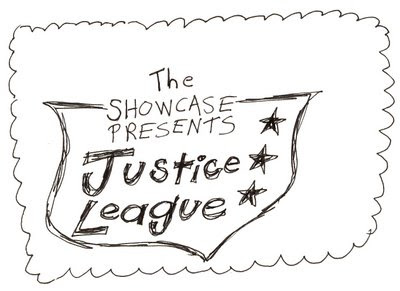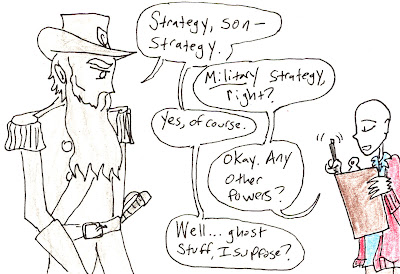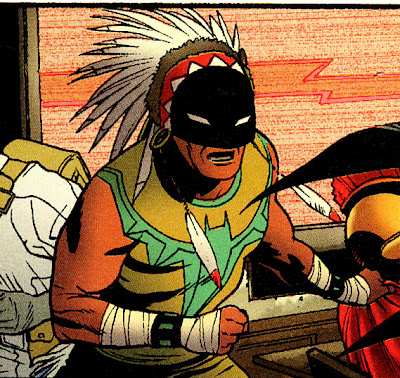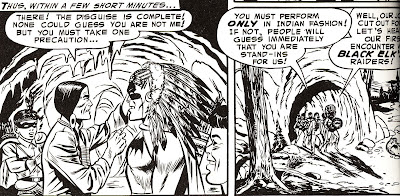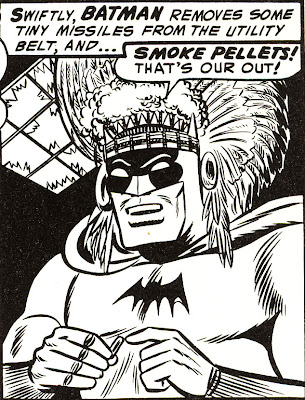Here’s a completely accurate one-panel, no-word review of Kazuo Umezu’s
Reptilia:

Would you prefer a review with more words? Well then, you should check out this week’s
Las Vegas Weekly comics column—it’s chockfull of words about
Reptilia.
Meanwhile, elsewhere in the blogosphere…

 Grim and gritty, or just grim and shitty?:
Grim and gritty, or just grim and shitty?: Over at When Will The Hurting Stop,
Tim O’Neil makes fun of what must be the stupidest thing I’ve seen in my weekly in-shop flip-throughs of
Countdown. Putting aside my knee-jerk nerd reaction (But Mxyzptlk is a fifth-dimensional being! How can a third dimensional being like Prime hurt him? And why how does Mxy vomit? Does he even eat food? Or have a digestive system?), what’s really galling about this scene isn’t merely the usual ludicrous darkening of DC’s superhero universe, but the target of that darkening on display here.
I mean, Mr. Mxyzptlk is perhaps the single silliest, goofiest concept ever attached to Superman, a character whose history is bursting at the seams with silly, goofy concepts. While the ‘80s reboot saw the culling of a lot of that Silver Age silliness—the various super pets, his cousin from Krypton, Jimmy Olsen’s total awesomeness—Mxy survived, the least plausible, least realistic element of modern Superman comics.
From the outside looking in, the character is a symbolic representation of everything that’s lighthearted, fun, funny and childlike in the Superman mythos.
So of course he’s chained, beaten, tortured and scarred in the pages of
Countdown.
I’ve always assumed it was unintentional that so many of the characters symbolic of fun in the DC line have been raped, killed and tortured in the last few years, that the same relative unpopularity of the characters that allowed them to be made into fun or funny characters also made them disposable (That is, you can get away with a lot more in your depiction of Blue Beetle than you can Batman). But it’s only been a matter of months since they buried Impulse, and a few weeks since they slaughtered everyone in that
Teen Titans special, and now they’ve got their mischeivous fifth-dimensional imp shirtless, shackled and puking his guts up.
Surely at some point the thought must have crossed someone’s mind that eventually this is going to start looking like a
conscious campaign to pervert everything fun left in the fictional universe.
 Wonderful!:
Wonderful!: If you haven’t already, be sure to check out Project Rooftop for a slew of
Wonder Woman costume redesigns by some very talented folks, with responses from the usual commentators, plus special guest commentators, like current
Wonder Woman writer Gail Simone.
Long time readers know Wonder Woman is a popular subject of conversation here at EDILW, and I think her costume is something pretty problematic in general.
That thing is
constantly being tweaked along a rather small spectrum of changes (with only
mod “New” Wonder Woman and
biker shorts-and-bra Wonder Woman really breaking out of that spectrum), many of them so subtle the artists paid to draw her don’t always take note (The shape of her belt, the shape of the design on her bodice, the cut of her boots, etc).
The result is that Wonder Woman’s costume is constantly being messed with, but never really changes much.
What really struck me while looking through the designs on Project Rooftop (I posted
Maris Wicks’ at the top there; I love the invisible horse, and the look on her Wondy’s face as she rides it; a Wicks Wonder Girl one-shot from
Earth-Justice Riders would be aces, wouldn’t it?), were the comments like, “This would be good for Donna Troy or Wonder Girl, but looks a little young for Wonder Woman.”
You know, Donna Troy and Wonder Girl have had a succession of some truly godawful costumes. While Wonder Girl finally has a decent one (the jeans and Silver Age Wonder Girl top look), Donna’s still wearing an extremely uncomfortable mixture of her Perez red leotard re-colored to resemble a night sky.
Isn’t it weird that there are all these great designs for Wonder Woman costumes literally just lying around the Internet, and DC dresses their gals as they do? It seems like a real shame.
Also, it’s interesting how much enthusiasm there is for the characters, by so many very talented artists, ones so passionate about the characters that they put the necessary thought and time into creating these costumes, and it’s being spurred on by a third party. Wouldn’t it be nice to see DC try to harness the energy of these sorts of events somehow? Like, by hosting their own contests, with the winner getting to draw a Wonder Woman back-up story or something, or even just publishing a book full of pin-ups and costume designs? I don’t know,
I’d buy a book full of pages of Project Rooftop redesigns of DC hero costumes, but maybe there isn’t a very big market for it.
Or would DC actually getting involved, making something like this “official,” just kind of ruin the spirit of it?
I don’t know, it’s just kinda odd that there’s so much interest in and excitement about Wonder Woman in the world—as evidenced here, and in the recent
Wonder Woman Day—but there seems to be so much less interest and excitement about her within DC’s line of comic books, in which
Wonder Woman has been bad to unreadable for the last few years, and spin-offs featuring her and her supporting cast have generally been much, much worse (
Amazons Attack,
Wonder Girl,
JLoA,
Teen Titans,
Countdown etc).
Oh, but back to Wonder Woman costume design, if DC
actually took on one of these for the “official” Wonder Woman costume, I’d go with
Daniel Krall’s:

It’s really a nice mix of the costume in the original Golden Age book (still the best Wonder Woman comics) with the interest in mythology that has become increasingly important in post-Crisis Wonder Woman comics.
In addition to those posted at Project Rooftop’s page, the runners-up have all been posted
here. Check ‘em out.
 This is why comic book characters should always just say “@#$%!”when they swear:
This is why comic book characters should always just say “@#$%!”when they swear: Comic Book Resources’ critic Hannibal Tabu kinda sorta almost starts an interesting conversation in
this week’s “Buy Pile” column, regarding usage of the “N-word” in comics, using white creators Garth Ennis and Darick Robertson’s usage of it in
The Boys to bring comics into the traditional dialogue of who gets to say it in popular entertainment, whether keeping it, um, taboo grants it too much power, and so on. Tabu gets into it a bit deeper at
his myspace blog, where he can be a bit freer in discussing swear words.
Tucker Stone, whose caustic commentary makes his “Comics of the Weak” reviews among the most fun to read each week, obliquely makes fun of where Tabu draws the line
in his own review of the last issue of The Boys:
You know, because a comic that doesn't have respect for common decency, contains graphic violence, sex and language, satirizes every aspect of mainstream comics including dead creators, ridicules American shame regarding hetero-,homo-, and ear canal sex, should somehow know better than to use a racial epithet. Cut a guy’s face off, put it on a pizza, but God forbid you drop an n-bomb. That's Across The Line.As a white guy, these kinds of conversations can be pretty awkward to enter into, particularly when it’s started by someone who says that white fiction writers can’t put the word in the mouths of fictional black characters. (Can we talk about
talking about it, then?).
I think Tabu’s got a damn good point, and I know Quentin Tarantino’s liberal usage of it in his films always rings false and seems in particularly poor taste to me, but I haven’t given usage of the “N-word” by comic book writers the same sort of thought I’ve given its usage in other media, like film and music (And I think I’ve heard it several billion times in music at this point in my life, almost exclusively by black performers, with the sole exception of Patti Smith’s
Rock ‘n Roll Nigger, and covers of the same).
Perhaps that’s because it comes up less often in comics than in other media, or perhaps it’s because fewer people read comics than watch movies or listen to rap music, and thus there are fewer people pontificating on the opinion pages and cable punditry shows on the language used in comics.
At the moment, I’m kind of having a hard time thinking of instances of it being used in comics, actually. Tabu mentions Brian K. Vaughan using it in
Y: The Last Man but I don’t remember it, nor do I remember it being used in Ennis’
Punisher arc “Kitchen Irish,” which Tabu also mentions (What sticks with me most about that story was the amount of violence—there was a dude whose
job was to saw people into small pieces—and Indictment #26 of the religious/ethnic violence in Ireland from Ennis).
I’m pretty sure it was used in
Dock Walloper #1, by a racist character in a period piece set in the early part of last century, but which was also written by a coupla white guys (I
think; one interesting thing about comics is that so many of the creators are just names, and often times there’s no way of telling what race the people who make them actually are; for example, I have no idea if Jimmy Palmiotti, who wrote
Dock Walloper with white guy Ed Burns, is black or white or neither).
Did James Sturm use it in his baseball story at the end of
James Sturm’s God, Gold and Golems? I think he might have had an angry member of the crowd use it in reference to the big, black guy who later plays the golem, but, again, I don’t recall.
As a critic, I’m not sure it’s responsible to publicly say something like, “I’ll never review another comic by this writer, because he did something in his story I find morally repugnant.” (Actually, Tabu said, “This column is officially done with the work of Garth Ennis.”) But then, the field of comics criticism is a little different than, say, literary criticism or film criticism, in that the space between professional, semi-professional and amateur critics is so much smaller, and it’s so much easier to become a critic (Basically, anyone with an Internet connection can become a critic, and reach roughly the same audience; there’s relatively little in the way of print criticism). Some of the better comics critics may or may not get paid for what they write (i.e. be “professionals” in the traditional sense) or not get paid very much, or paid less than critics who aren’t quite as astute. (For example, I’m not sure how much Tom Spurgeon makes for the work he does, but he seems a much better comics critic than those who write for, say,
Entertainment Weekly or
The Onion’s A.V. Club, who most certainly are “professional” in the traditional sense; likewise, pretty much everyone at
TheSavageCritics.com is a better critic than pretty much everyone at
Wizard, but the former get a share of donations, as I understand it, while the latter get some sort of paycheck).
The weird thing about Tabu’s protest is that due to the specific nature of his column, the fact that he reads
everything for free, and only buys a few of the books, with those being bought constituting the designation of what’s best, there’s no real economic component to a boycott of Ennis’ future work (I should probably here note that I read Tabu’s column every Thursday morning, and kinda like the set-up; if nothing else, it’s a unique way of rating comics). In fact, if “The Buy Pile” just completely ignores
The Boys, it may prove more helpful to the book; a negative review a month is probably less helpful than no review at all, you know?
Finally, as someone notes in a response on Tabu’s myspace entry, Tabu himself noted that he knows lots of black folks who use the word regularly (including his significant other), which seems to indicate that Ennis having a black character use it in casual conversation is simply observant, naturalistic writing, not the same as Ennis himself using it to describe black folks.
As for Ennis’ usage of the word in
The Boys, I can’t say how appropriate or inappropriate it actually is, as I lost interest in and dropped the series a long time ago, and am just going off the one panel Tabu posted and what he had to say about the book.
I did read enough issues—the first four, maybe?—to understand that it’s a series devoted to trying to be as outrageous as possible, so the presence of the “N-word” doesn’t seem out of place there, and if Ennis is simply putting it in the mouth of a black character using it in casual conversation, it doesn’t strike me as offensive, particularly in relation to all the other stuff going on in that book, some of which Stone alluded to in his review.
So I don’t know—is this just the same old debate we’ve seen over movies, music and daily conversation, with the same old questions? Who can say it? When can they say it? Is it better to say it a lot and rob it of its power, or never ever say it at the risk of keeping it powerful? Or is there anything specific to comics as a medium that bring a fresh angle to the discussion? Or to criticism, of comics or otherwise, that brings a fresh angle?
I don’t know. Like I said, Tabu almost kinda sorta started the conversation, but not really, so I’m not sure where we can go from here anyway. Personally, I don’t see anything comics-specific about the debate, but if anyone
does, I’d be very interested to hear about it.




















